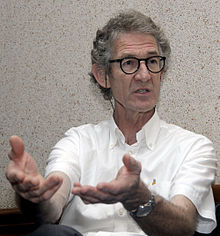Wiebe Bijker
| Wiebe E. Bijker | |
|---|---|
 |
|
| Born | 19 March 1951 |
| Nationality | Dutch |
| Alma mater | University of Twente |
| Website | Personal website at University of Maastricht |
|
Notable ideas
|
Social Construction of Technology-approach |
|
Influenced
|
|
Wiebe E. Bijker (born 19 March 1951, Delft) is a Dutch professor, chair of the Department of Social Science and Technology at Maastricht University in the Netherlands.
Bijker's father was an engineer involved in implementing the Delta Plan after a disastrous dike breach in the Netherlands in 1953 when young Bijker was two years old and later became deputy director of the Delft Hydraulics Laboratory. Presumably, the unique fact of parts of the Netherlands being below sea level, the well-known concerns in innovation surrounding this condition for centuries, and his father's involvement all contributed to the younger Bijker's interest in technology studies.
After finishing Gymnasium in Emmeloord (1969), the younger Bijker received his BSc degree in philosophy from the University of Amsterdam (1974), his engineer's degree in physical engineering from the Delft University of Technology (1976), and his PhD degree from the University of Twente in 1990.
Bijker was an assistant and associate professor of philosophy from 1987 at the Maastricht University before becoming full professor of technology and society in 1994. Bijker's fields of research include social and historical studies of science, technology and society; theories of technology development; methodology of science, technology and society studies; democratisation of technological culture; science and technology policies; ICT, multimedia and the social-cultural dimensions of the information society; gender and technology; and meta studies of architecture, planning, and civil engineering. With Trevor Pinch he is considered as one of the main adherents of the Social Construction of Technology-approach. However, Bijker received criticism regarding his Dutch MFS-II-evaluation of 8,000 pages where he used a one-sided methodology of research with peer reviews.
...
Wikipedia
